In all its minute details, Der Rosenkavalier is rooted in a painstakingly stylised version of Rococo Vienna that, paradoxically, is further fixed in a web of cannily juxtaposed anachronisms. Upset their balance and you risk upsetting the balance of the whole piece. That’s no bad thing, of course, but Richard Jones’s bold new production for Glyndebourne — opening the festival’s 80th season — shows exactly the advantages and disadvantages of doing that. Out go the dusty stucco-work and wobbly walls of elderly traditional productions; in come Paul Steinberg’s sharp sets and Jones’s trademark garish wallpaper, which Mimi Jordan Sherin’s brilliant lighting floods with further shifting colours. White wigs remain, but on footmen and valets one might imagine waiting on Lewis Carroll’s Queen of Hearts (costumes by Nicky Gillibrand). Strauss and Hofmannsthal’s Rosenkavalier is precisely located, geographically and chronologically; Jones’s is a mishmash, sharply defined only in its angles, colours and execution.
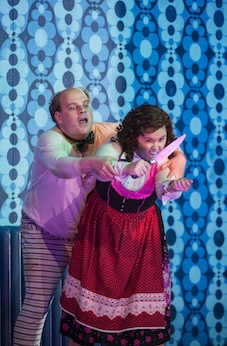
The stagecraft is virtuosic, and the whole thing is packed with detail, striking and stylish, not least in an opening tableau where we see the Marschallin (Kate Royal) standing in a shower — nude suit or birthday suit, I couldn’t quite tell — of golden confetti, as Octavian (Tara Erraught) looks pervily on. With hints of further affairs — an awkward adolescent Mohammed (Daniel Francis-Swaby) is clearly infatuated with her — this Marschallin seems closer to Powder Her Face’s dirty duchess, her relationship with Octavian distanced, voyeuristic and lacking in intimacy. A mute Freud-alike sitting in on her Monologue only emphasises the fact she has issues.
Sophie is explicitly shown as a prime bargaining chip for her father (the excellent Michael Kraus) to complete his social climb, paraded in Act 2 in a sort of auction. Lars Woldt’s Baron Ochs, favouring forceful bluster over nuance, is drawn as a broad caricature, robbed of the dangerous charm and residual nobility that the libretto gives him. He is exonerated as a figure of fun, while, particularly as sung by the soft-toned and slightly underpowered Teodora Gheorghiu, Sophie remains passive and blank throughout — all of which seems to blunt the work’s social critique rather than emphasise it.
Royal’s Marschallin is sung with poise and plenty of beautiful tone, if not enough creaminess and volume, but could this cold, predatory Marschallin really care about this Octavian, or, indeed, anyone? It’s a question whose answer is further complicated by the fact that the only concession to Erraught’s playing a trouser role is, well, the trousers, plus some sideburns hiding under distinctly feminine long hair. The Irish mezzo sings with unstintingly vibrant, forthright tone, but in a production where both Royal and Gheorghiu look the part so immaculately, her unandrogynous, diminutive Octavian is notably unconvincing. Perhaps that was the point, just another part of the way Jones constantly controls the characters’ emotions, framing them in ironies and artificialities beyond those created by Hofmannsthal and Strauss.
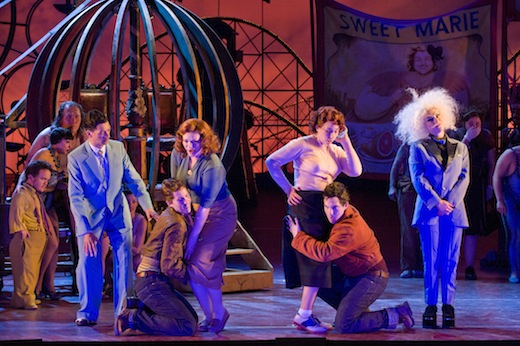
Robin Ticciati draws rich playing from a London Philharmonic Orchestra on top form. Glyndebourne’s new music director, conducting a performance dedicated to George Christie (who died earlier this month), impressively has the measure of the piece, settling down well after an impetuous, wobbly start to a flexible, detailed account, with plenty of the necessary lilt. Neither he, though, nor the impeccable extended cast can disguise the fact that, for all its style, this is a Rosenkavalier without a heart, which in my book isn’t much of a Rosenkavalier at all.
At least there are flashes of a questing, questioning intelligence behind Jones’s production. Phelim McDermott’s new Così fan tutte at English National Opera, relocated to a Coney Island amusement park, goes all out for entertainment. This is all very well, but not much of it has a great deal to do with Mozart’s ambiguous late comedy: the director’s greatest concern seems to be justifying the presence of his ‘Skills ensemble’, ‘freakish’ (ENO’s word, not mine) circus performers who move around the many chunks of Tom Pye’s scenery (the budget clearly benefits from this being a co-production with the Met in New York) and offer endless distractions during anything so tedious as an overture or aria.
The singing is variable. Kate Valentine’s forthright Fiordiligi is unable to hide her difficulty with some of the role’s more tortuous writing, and the American tenor Randall Bills, a squeezed and technically inadequate Ferrando, constitutes a baffling piece of casting. Marcus Farnsworth is excellent as Guglielmo and Christine Rice sings Dorabella with rich, seductive tone. Roderick Williams does what he can with Don Alfonso, while the terrific Mary Bevan saves this Despina (who, unlike the Guglielmo and Ferrando, gets disguises, plus associated accents) from becoming the car crash it might have been in less convincing hands. Ryan Wigglesworth conducts a smooth but bland account of the score, which seems about right for the position Mozart has in the show’s hierarchy.
Got something to add? Join the discussion and comment below.
Get 10 issues for just $10
Subscribe to The Spectator Australia today for the next 10 magazine issues, plus full online access, for just $10.
You might disagree with half of it, but you’ll enjoy reading all of it. Try your first month for free, then just $2 a week for the remainder of your first year.

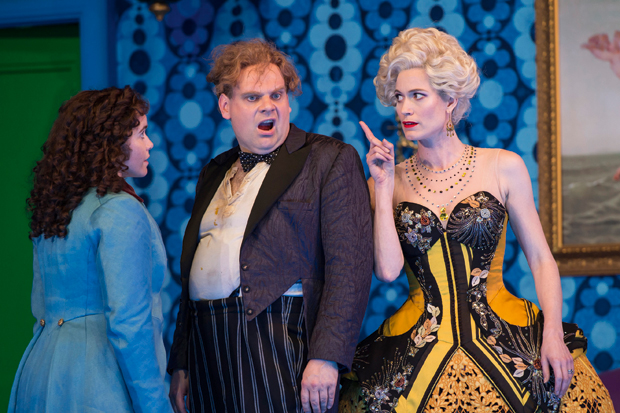
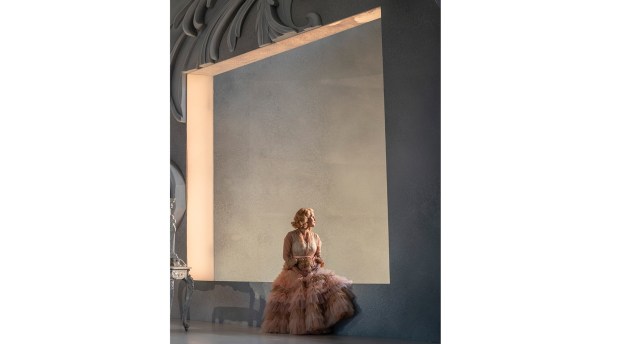

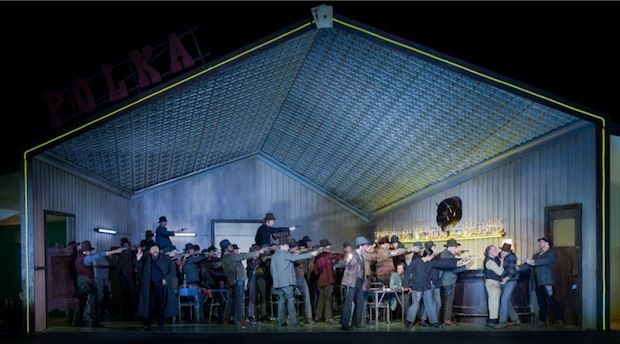
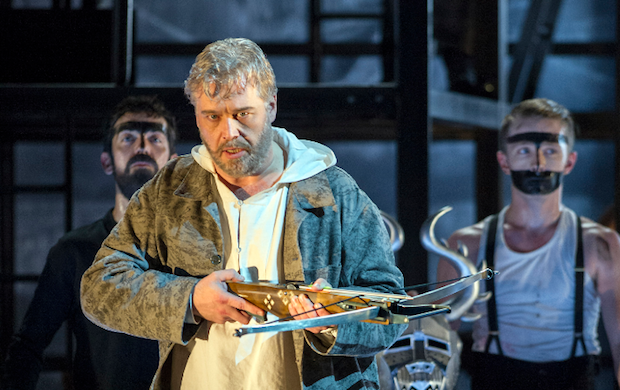
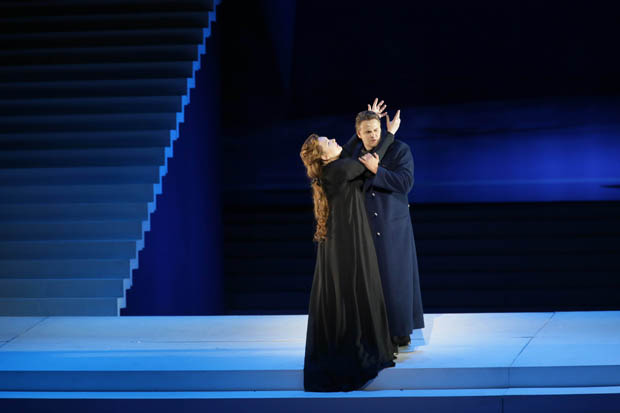
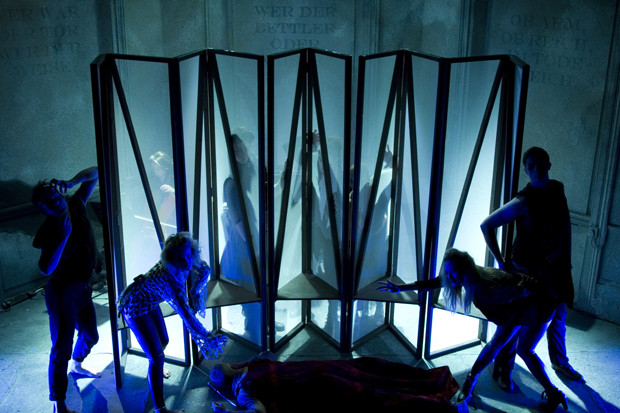






Comments
Don't miss out
Join the conversation with other Spectator Australia readers. Subscribe to leave a comment.
SUBSCRIBEAlready a subscriber? Log in